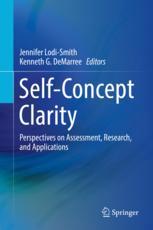

Most ebook files are in PDF format, so you can easily read them using various software such as Foxit Reader or directly on the Google Chrome browser.
Some ebook files are released by publishers in other formats such as .awz, .mobi, .epub, .fb2, etc. You may need to install specific software to read these formats on mobile/PC, such as Calibre.
Please read the tutorial at this link: https://ebookbell.com/faq
We offer FREE conversion to the popular formats you request; however, this may take some time. Therefore, right after payment, please email us, and we will try to provide the service as quickly as possible.
For some exceptional file formats or broken links (if any), please refrain from opening any disputes. Instead, email us first, and we will try to assist within a maximum of 6 hours.
EbookBell Team

4.8
54 reviewsThis welcome resource traces the evolution of self-concept clarity and brings together diverse strands of research on this important and still-developing construct. Locating self-concept clarity within current models of personality, identity, and the self, expert contributors define the construct and its critical roles in both individual and collective identity and functioning. The book examines commonly-used measures for assessing clarity, particularly in relation to the more widely understood concept of self-esteem, with recommendations for best practices in assessment. In addition, a wealth of current data highlights the links between self-concept clarity and major areas of mental wellness and dysfunction, from adaptation and leadership to body image issues and schizophrenia. Along the way, it outlines important future directions in research on self-concept clarity.
Included in the coverage:
· Situating self-concept clarity in the landscape of personality.
· Development of self-concept clarity across the lifespan.· Self-concept clarity and romantic relationships.
· Who am I and why does it matter? Linking personal identity and self-concept clarity.
· Consequences of self-concept clarity for well-being and motivation.
· Self-concept clarity and psychopathology.
Self-Concept Clarityfills varied theoretical, empirical, and practical needs across mental health fields, and will enhance the work of academics, psychologists interested in the construct as an area of research, and clinicians working with clients struggling with developing and improving their self-concept clarity.